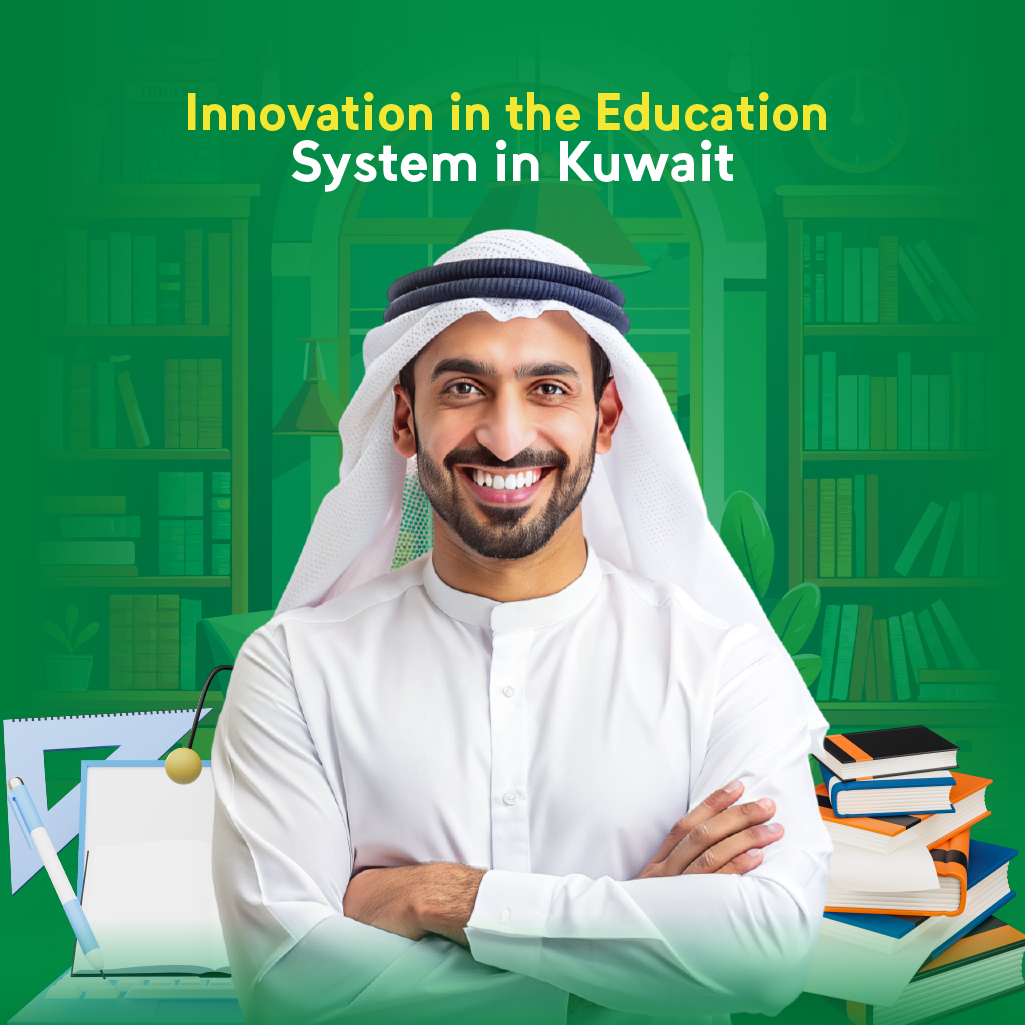
The Education System in Kuwait is undergoing a significant transformation, driven by a commitment to embracing innovation and modernizing traditional practices. With a focus on integrating cutting-edge technology, adopting progressive teaching methods, and fostering a culture of continuous improvement, Kuwait aims to prepare its students for the demands of the 21st century. This article explores the best practices and initiatives that are revolutionizing the Education System in Kuwait, highlighting the collaborative efforts of the government, educators, and private sector in creating a more dynamic and effective learning environment.
Driving Innovation in the Education System in Kuwait
The Education System in Kuwait is experiencing a wave of innovation, primarily fueled by robust government policies and initiatives aimed at modernizing and enhancing the educational landscape. Central to this transformation is the Ministry of Education, which plays a pivotal role in fostering a culture of innovation across schools and universities in Kuwait.
Government Initiatives for Technological Integration
-
Integration of Technology in Classrooms:
- The Kuwaiti government has introduced several key initiatives to promote educational innovation. One of the most significant policies is the integration of technology into the classroom. This initiative involves equipping schools with state-of-the-art digital tools, such as interactive smart boards, tablets, and e-learning platforms, to facilitate a more engaging and interactive learning experience. These technologies are designed to cater to the diverse learning needs of students.
-
Support for Innovative Teaching Methods:
- In addition to technological advancements, the government has also implemented policies to support innovative teaching methods. Programs such as flipped classrooms, project-based learning, and personalized learning plans are being encouraged to move away from traditional rote learning methods. These approaches emphasize critical thinking, problem-solving, and collaborative skills, which are essential for students in the modern world.
-
Role of the Ministry of Education:
- The Ministry of Education in Kuwait is at the forefront of these initiatives, playing a crucial role in their implementation and success. The Ministry organizes regular training sessions and professional development programs for teachers, ensuring they are well-equipped to utilize new technologies and innovative teaching methods effectively. By investing in the continuous development of educators, the Ministry ensures that the quality of education is consistently improving.
-
International Collaboration:
- Furthermore, the Ministry of Education actively collaborates with international organizations and educational experts to bring global best practices to Kuwaiti schools. These partnerships help in benchmarking Kuwait’s educational standards against international norms, ensuring that students receive a world-class education. Programs like student exchange and international teacher training workshops are examples of how the Ministry leverages global expertise to benefit the local education system.
-
Emphasis on STEM Education:
- Another significant aspect of the government’s support for educational innovation is the emphasis on STEM (Science, Technology, Engineering, and Mathematics) education. Recognizing the importance of STEM fields in the global economy, the government has launched various initiatives to promote STEM learning. These include specialized STEM schools, competitions, and extracurricular programs that encourage students to explore and excel in these subjects.
-
Inclusive Education Policies:
- The inclusive education policies are also noteworthy. The government is committed to making education accessible to all students, including those with special needs. By implementing assistive technologies and specialized programs, the Ministry of Education ensures that every student, regardless of their abilities, can benefit from a high-quality education.
The Education System in Kuwait is being transformed through a series of forward-thinking governmental policies and initiatives. The Ministry of Education plays a critical role in driving this innovation, ensuring that educators and students are well-prepared for the challenges and opportunities of the future. Through its commitment to continuous improvement and collaboration with international experts, Kuwait is setting a benchmark for educational excellence in the region.
Innovations in the Education System in Kuwait
The Education System in Kuwait is embracing the digital revolution by integrating advanced technology into classrooms. This technological integration aims to enhance the learning experience, making education more engaging and effective for students.
Technological Integration in Classrooms
-
Smart Boards:
- Replace traditional chalkboards with interactive boards.
- Allow teachers to present multimedia lessons and access online resources.
- Engage students through interactive activities, improving understanding and retention.
-
Tablets:
- Provide access to educational apps, digital textbooks, and online resources.
- Enable personalized learning, allowing students to progress at their own pace.
- Support collaborative learning through real-time sharing and project collaboration.
-
E-learning Platforms:
- Offer online courses, video lectures, and interactive assignments.
- Make education more flexible and accessible, particularly for students with special needs or those in remote areas.
Benefits and Challenges of Technological Integration
-
Benefits:
- Enhance student engagement and motivation through interactive and enjoyable learning experiences.
- Provide access to a wealth of information and resources, fostering independent research and knowledge expansion.
-
Challenges:
- Addressing the digital divide, ensuring all students have access to necessary devices and internet connectivity.
- Overcoming the learning curve for teachers and students in using new technologies effectively, requires adequate training and support.
Innovative Teaching Methods in Kuwaiti Education
In addition to technological integration, the system in Kuwait is adopting innovative teaching methods to improve student learning outcomes. These methods aim to move beyond traditional rote learning and encourage critical thinking, creativity, and collaboration.
-
Flipped Classrooms:
- Students watch video lectures or review online materials at home.
- Classroom time is used for interactive discussions, problem-solving activities, and hands-on projects.
- Enables deeper understanding and application of knowledge.
-
Project-Based Learning (PBL):
- Involves students working on real-world projects requiring critical thinking and collaboration.
- Develops a deeper understanding of subjects and practical skills.
- Engages students in projects relevant to their lives and interests.
-
Personalized Learning:
- Tailors instruction to each student’s strengths, weaknesses, and interests.
- Allows students to progress at their own pace and receive targeted support.
- Results in a more effective and individualized educational experience.
Case Studies of Success in Kuwaiti Schools
-
Flipped Classroom Model:
- Implemented in a Kuwait City school for science courses.
- Resulted in increased student engagement and active participation in class discussions.
- Improved test scores due to better grasp of concepts through interactive activities.
-
Project-Based Learning in Social Studies:
- Adopted by a school for its social studies curriculum.
- Projects related to local history and culture enhanced understanding and fostered community pride.
- Increased student motivation and ownership of learning.
The integration of technology and the adoption of innovative teaching methods are transforming the education system in Kuwait. By leveraging smart boards, tablets, and e-learning platforms, and embracing approaches like flipped classrooms, project-based learning, and personalized learning, Kuwait is creating a more dynamic, engaging, and effective educational environment. These advancements not only enhance student learning outcomes but also prepare them for the challenges and opportunities of the future.
Enhancing Teaching Quality and Student Outcomes in Kuwait
In the rapidly evolving landscape of education, professional development for educators is crucial for ensuring that teaching methods remain effective and relevant. The Education System in Kuwait recognizes this need and has implemented several initiatives to provide teachers with ongoing professional development and training. These initiatives focus on equipping educators with innovative teaching skills, ultimately enhancing teaching quality and improving student outcomes.
Initiatives for Professional Development
The Ministry of Education in Kuwait has launched numerous programs to support the continuous professional growth of teachers. One prominent initiative is the establishment of regular training workshops and seminars. These sessions cover a wide range of topics, including the latest educational technologies, modern pedagogical strategies, classroom management techniques, and methods for fostering critical thinking and creativity among students. By staying abreast of the latest trends and best practices in education, teachers are better prepared to deliver high-quality instruction.
In addition to workshops, the Ministry has developed a comprehensive online platform for professional development. This platform offers a variety of resources, such as video tutorials, interactive modules, and webinars, allowing teachers to access training materials at their convenience. The flexibility of online learning ensures that educators can engage in professional development activities without disrupting their teaching schedules.
Collaboration with international educational organizations is another key aspect of Kuwait’s professional development initiatives. The Ministry partners with renowned institutions and experts to bring global perspectives and best practices to Kuwaiti teachers. These collaborations often include exchange programs, where teachers have the opportunity to visit schools in other countries, observe different teaching methods, and share their experiences with peers upon returning home.
Impact on Teaching Quality and Student Outcomes
The impact of these professional development initiatives on teaching quality and student outcomes is significant. Teachers who participate in ongoing training and development programs are more confident and competent in their roles. They are equipped with innovative teaching strategies that engage students, promote active learning, and cater to diverse learning needs.
Studies have shown that students taught by teachers who have undergone extensive professional development perform better academically. These students demonstrate higher levels of critical thinking, problem-solving, and creativity. They are more motivated and engaged in their learning, which leads to improved academic outcomes and overall school performance.
For example, a school in Kuwait implemented a series of professional development workshops focused on integrating technology into the classroom. As a result, teachers became proficient in using digital tools and resources, which transformed the learning experience for students. Interactive lessons, multimedia presentations, and online assessments became commonplace, increasing student participation and improved test scores.
Moreover, professional development initiatives contribute to the overall well-being and job satisfaction of teachers. Educators who feel supported and valued are more likely to remain in the profession and continue contributing to the education system. This retention of skilled and experienced teachers is vital for maintaining a high standard of education in Kuwait.
Elmadrasah.com: Championing Innovation in Kuwait
Elmadrasah.com has emerged as a pivotal platform in the advancement of Kuwait’s education system, offering a wide range of courses and articles that focus on innovation and best practices. This online educational resource is dedicated to enhancing the skills of educators, enriching student learning experiences, and fostering a culture of continuous improvement in Kuwaiti schools.
Comprehensive Course Offerings
-
Courses on Latest Teaching Methodologies and Technological Tools:
- Designed to equip educators with up-to-date teaching strategies.
- Cover essential topics such as integrating technology in the classroom and innovative teaching methods.
- Provide professional development strategies to enhance teaching effectiveness.
-
Focus on Integrating Technology:
- Courses on using smart boards, tablets, and e-learning platforms.
- Aim to create dynamic and engaging learning environments.
- Help teachers gain insights into the effective use of digital tools.
-
Flipped Classroom Model:
- Educators learn to reverse traditional teaching methods.
- Prepare video lectures and online materials for students to review at home.
- Free up classroom time for interactive activities, discussions, and hands-on projects.
- Lead to a deeper understanding of the subject matter.
-
Project-Based Learning (PBL):
- Courses help teachers design and implement real-world projects.
- Encourage critical thinking, collaboration, and problem-solving.
- Engage students in meaningful learning experiences relevant to their lives and interests.
- Foster a love for learning and develop essential skills for the future.
Elmadrasah.com’s comprehensive course offerings empower educators to adopt innovative teaching methods and integrate technology effectively in their classrooms. By focusing on flipped classrooms and project-based learning, this platform contributes significantly to enhancing the educational landscape in Kuwait, ensuring students receive a modern, engaging, and effective education.
Insightful Articles on Best Practices and Initiatives
In addition to its comprehensive courses, Elmadrasah.com offers a wealth of articles that explore best practices and initiatives in Kuwait’s education system. These articles provide valuable information on government policies and support mechanisms that promote educational innovation. They highlight the efforts of the Ministry of Education in creating a conducive environment for innovative teaching and learning .
Key Articles on Educational Innovation
-
Integration of Technology in Classrooms:
-
-
- Discusses the benefits and challenges of integrating technology in classrooms.
- Explores how smart boards, tablets, and e-learning platforms can transform the learning experience.
- Highlights the potential for making education more interactive and accessible.
- Addresses challenges such as the digital divide and the need for adequate training and support for teachers.
-
-
Professional Development for Educators:
-
- Examines the role of professional development in enhancing teaching quality and student outcomes.
- Outlines various initiatives aimed at providing ongoing training and support for educators.
- Emphasizes the importance of equipping teachers with the skills needed to implement innovative teaching methods.
- Highlights the positive impact of these initiatives on teaching effectiveness and student achievement.
Elmadrasah.com’s articles provide in-depth insights into the mechanisms that drive educational innovation in Kuwait. By exploring topics such as technological integration and professional development, these resources help educators and policymakers understand and implement best practices, ultimately contributing to the continuous improvement of Kuwait’s education system.















